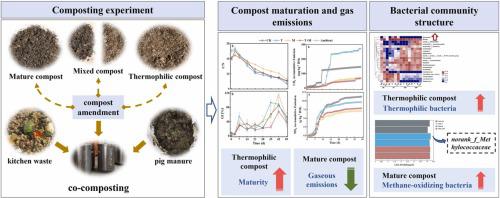Thermophilic compost inoculating promoted the maturity and mature compost inoculating reduced the gaseous emissions during co-composting of kitchen waste and pig manure
引用次数: 0
Abstract
This study investigated the effects of inoculating thermophilic and mature composts on maturity, gaseous emissions, and bacterial communities during the co-composting of kitchen waste and pig manure. Results showed that the temperature peaked on day 4 of the inoculation compost amendment, which was earlier than the control treatment on day 8. In particular, the GI of the inoculated thermophilic compost was higher (88.65%) than that of other treatments (GI≤61%) on day 35. The addition of the thermophilic compost promoted the enrichment of Bacillus and Planifilum, accelerated organic matter degradation, and enhanced maturity. Inoculation with mature compost reduced CH4 emissions by 50.66%, owing to the enrichment of methane-oxidizing bacteria (norank_f_Methylococcaceae). Furthermore, the mature compost decreased NH3 emissions by 36.16% through physical absorption and microbial activity (reducing NH4+ production). Inoculation with compost amendment increased N2O emissions owing to the enhanced denitrification of the nitrate reduction function. Overall, thermophilic compost addition enhanced the composting process and improved maturity, whereas mature compost addition was more effective in reducing gaseous emissions during the co-composting of kitchen waste and pig manure.

嗜热堆肥的接种促进了堆肥的成熟,成熟堆肥的接种减少了餐厨垃圾与猪粪共堆肥过程中的气体排放
本研究研究了在餐厨垃圾和猪粪共堆肥过程中接种嗜热堆肥和成熟堆肥对堆肥成熟度、气体排放和细菌群落的影响。结果表明:接种堆肥改进剂后第4天温度达到峰值,比对照处理的第8天温度达到峰值要早;特别是在第35天,接种的嗜热堆肥的GI(88.65%)高于其他处理(GI≤61%)。嗜热堆肥的添加促进了芽孢杆菌和拟生菌的富集,加速了有机质的降解,提高了堆肥的成熟度。由于甲烷氧化菌(norank_f_Methylococcaceae)的富集,接种成熟堆肥使CH4排放量减少了50.66%。此外,成熟堆肥通过物理吸收和微生物活动(减少NH4+的产生)减少了36.16%的NH3排放。接种堆肥改进剂增加了N2O排放量,这是由于硝酸盐还原功能的反硝化作用增强。总体而言,嗜热堆肥的添加促进了堆肥过程并提高了成熟度,而成熟的堆肥添加在减少餐厨垃圾和猪粪共堆肥过程中的气体排放方面更为有效。
本文章由计算机程序翻译,如有差异,请以英文原文为准。
求助全文
约1分钟内获得全文
求助全文

 求助内容:
求助内容: 应助结果提醒方式:
应助结果提醒方式:


